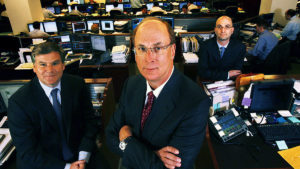On 4 June, 2004, Kofi Annan ascended the dais at the Assembly Hall to conclude a meeting that would leave an indelible mark on the world for the next two decades. There, speaking to nearly 500 global decision makers in attendance, Annan spoke in soaring rhetoric about a new paradigm for government, business and social leadership. A new era of hope was ushered in.
Almost 20 years later, the first Global Compact Leadership Summit is considered the birthplace of the ESG movement, a kind of constitutional convention for global “governance”. Annan had been championing this new approach since at least 1999, when, at the World Economic Forum in Davos, he announced the creation of “a global compact of shared values and principles, which will give a human face to the global market”. The aim would be to create a “compact” of agreements that could keep up with the radical change being wrought by globalising markets. It would, of course, do much more than that.
Since Annan’s proclamation, ESG has morphed into a social and corporate inevitability. Its manifestations are evident everywhere — from academia’s heady embrace of Diversity, Equity and Inclusion initiatives to the corporate world’s collective gush over protecting the environment, preventing racism and advancing whatever else might be the “current thing” of international righthink.
Its rise appeared unstoppable — until 2023 arrived. Only this month, Republicans in Congress announced they would subpoena BlackRock, the asset management firm most closely aligned with ESG, and State Street, another Fortune 500 financial heavyweight, to investigate whether their ESG policies violate anti-trust law. Days after that news broke, the state of Tennessee announced it was suing BlackRock for making what it called “misleading” statements about ESG.
For its part, BlackRock — undoubtedly the greatest champion of ESG — is retreating, backing “just 7% of environmental and social proposals at companies’ annual meetings in 2023 proxy season, down from 47% two years earlier,” according to the Financial Times. In the UK, signs of a brewing backlash are just as evident. The Confederation of British Industry (CBI), a major lobbying group, has hired Rupert Soames, a critic of ethical investing, as its next president.
For some, the pivot away from ESG may come as a shock. But the reality is that the equilibrium has been shifting for more than a year. One of the strongest indicators that all was not well with ESG came from the most unlikely of places: the annual letter from ESG’s most high-profile supporter. Larry Fink, chairman and CEO of BlackRock, began publishing his letters to shareholders and CEO in 2012 in which he introduced ESG-speak into the halls of capitalism. But this year, Fink told the Aspen Ideas Festival that he’s no longer using the term since it’s been “weaponised” by critics. And ESG was notably absent from his 2023 letter in March. This might be no more than a symbol of the influence of ESG. But in the context of a decade during which the acronym was proclaimed as a shibboleth of a new kind of global corporate power, one whose proponents construe profit-seeking as a means to an end, that end being nothing less than improving the lot of mankind, it is nevertheless significant.
It’s not hard to see why ESG won broad, even fervent, appeal in its early days. By the mid-2000s, American capitalism had begun to resemble its own caricature. The global economy of the late Nineties and early 2000s was defined not just by excess, but by excessive scandal: the ruinous “privatisation” of Russia; the triple header of Enron, Long Term Capital Management, and Bernie Madoff; and in the background, an Iraq War architected by the former CEO of a major oil industry services company. And then came the mother of all scandals: the 2008 Financial Crisis.
Today, with the media tightly aligned with ESG-embracing Big Business, it’s easy to forget how antagonistic the press was to large companies in the early and mid-2000s. “Transnational corporations” became a go-to epithet insinuating a cartel-like form of legalised corruption; financiers became objects of derision; films such as The Big Short, Arbitrage, Erin Brockovich and Thank You For Smoking highlighted corporate malfeasance.
The emergence of ESG may have been rooted in a genuine desire to do better. It’s hard to argue with calls, such as that of Brazilian president Lula da Silva at Annan’s 2004 Global Compact Leadership Summit, to see global leaders “engaged in a campaign to free all human beings from hunger”. The same holds true for preserving the natural environment and sharing the benefits — not the externalities — of corporate progress. After all, who doesn’t want a better world?
The problem with ESG, however, is that the practice didn’t match the theory. While ESG set out to make a difference, it ended up becoming a way for Big Business to flip the mass of negative attention into a positive, highly appealing ethos. ESG was all about upholding human rights and ensuring the planet didn’t get incinerated at the altar of ruthless capitalism. This meant that if you were against ESG, you were against ethics itself. And if you opposed the prerogatives of the Big Business espousing ESG, you were a heartless devotee of shareholder capitalism. This binary attitude suited firms such as BlackRock, which depend on, and compete fiercely for, a continuous inflow of fresh capital to invest. If BlackRock could successfully make the case that (a) your firm is the standard for ethical investment and (b) every other approach is so inefficient in the long term that it’s functionally corrupt, then the conclusion regarding which firms get the money is foregone. In other words, BlackRock found a way to win.
In the decade since Larry Fink began writing his letter to shareholders, in which he championed ideas such as “corporate governance and responsible investment”, BlackRock’s market cap quadrupled. The company now has $9 trillion under management, a testament not only to Fink’s financial genius but also to his unparalleled access to global leaders who make decisions at the billion-dollar level.
Fink, as a result, became a darling of the Davos set — and it was there that, in January, he chose to make another ESG confession, this one vastly more significant. At the WEF, he admitted that his firm’s close association with the ESG movement had cost BlackRock an estimated $4 billion in managed assets. While for many (if not most) asset management firms, this would be a fatal blow, it’s in fact a mere trickle lost in BlackRock’s financial ocean. But it’s also a headline. And, no matter how you spin it, it’s a loss — one that could spell the start of a devastating longer-term trend.
But there was another, more overlooked signal that all was not well with ESG. When Fink released this year’s ESG-free letter, it contained a second omission: in previous years, Fink wrote one letter to CEOs and a separate one to investors. This neatly reflected the concept of “stakeholder capitalism” at the heart of ESG, which calls for equal consideration of all the people involved in a company’s ecosystems, including employees, customers, and the public, not just its shareholders. But this year Fink wrote only a single letter — to investors. Was Fink signalling a retrenchment, a return to the unglamorous, nuts-and-bolts endeavour of shareholder capitalism?
The idea of stakeholder capitalism is attributed largely to Klaus Schwab, creator and chairman of the World Economic Forum, who began spreading the idea in a 1971 study he co-authored called “Modern Company Management in Mechanical Engineering”. This top-down approach to shaping how wealth is created, and in whose hands it ends up, played well to a media educated in America’s Marxism-infused liberal arts colleges. And the business crowd loved it too. Suddenly, bland business conferences felt less like trade conventions and more like geopolitical summits. You weren’t merely investing in funds, selling widgets, or cooking up ever more optimised ads. You were saving the world.
By 2021, ESG had reached its peak not just of influence but power. The pandemic seemed proof of the urgency of its policies. Endlessly, we heard that Covid was a result of mankind “encroaching” on nature, squeezing it until this abstract entity struck back. We were informed that cooperation was essential and non-compliance not an option.
But ESG’s recent victories are now starting to look pyrrhic. In 2022, Texas led a red-state boycott of BlackRock, announcing plans to pull more than $3 billion out of BlackRock funds. Since then, Republican state legislatures, including those in Florida, Kansas and Idaho, have passed laws that ban or limit the consideration of ESG.
In an even more existential blow to the ESG vision, money has become expensive. During the era of Zero Interest Rate Policy, there was enough cheap money, and enough margin, to sacrifice some of it for the sake of a good cause. But when money is tight, consumers are jittery, and investors running scared, companies take what they can get.
The cultural backlash underway is even bigger. In April, it only took a single misfired influencer outreach effort by Bud Light, which sent cans of beer to Dylan Mulvaney as part of a DEI-guided, trans-friendly campaign, to knock the brand from its top spot in American beer sales, carving 13% off its revenue. Even the Magic Kingdom has not escaped unscathed. After its battle with Florida Governor Ron DeSantis, among the most vocal opponents of ESG in American politics, Disney is now at its most vulnerable in decades, having seen billions in shareholder value wiped away and its once-pristine brand tainted by political controversy. There is no reason to think the trend will slow.
If there is one thing businesses and markets hate, it’s uncertainty. And ESG is starting to look like another unnecessary risk — more so given that ESG has become a valuable political leverage point for politicians looking to ride the surge of populism. This doesn’t mean ESG is done: one of the major problems identified by its critics is the extent to which it has embedded in vital institutions. But we may be at a turning point, and if the risk rises higher, and there is no substantial reward to follow, ESG might find itself on the corporate chopping block.
Disclaimer
Some of the posts we share are controversial and we do not necessarily agree with them in the whole extend. Sometimes we agree with the content or part of it but we do not agree with the narration or language. Nevertheless we find them somehow interesting, valuable and/or informative or we share them, because we strongly believe in freedom of speech, free press and journalism. We strongly encourage you to have a critical approach to all the content, do your own research and analysis to build your own opinion.
We would be glad to have your feedback.
Source: UnHerd Read the original article here: https://unherd.com/





